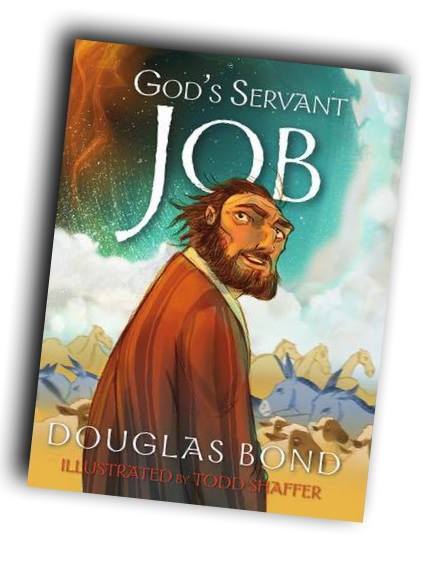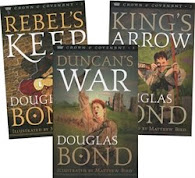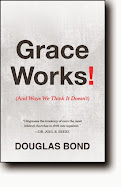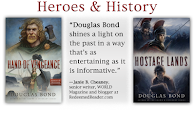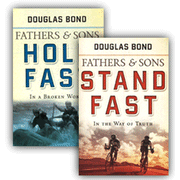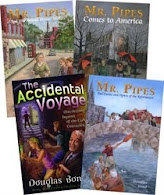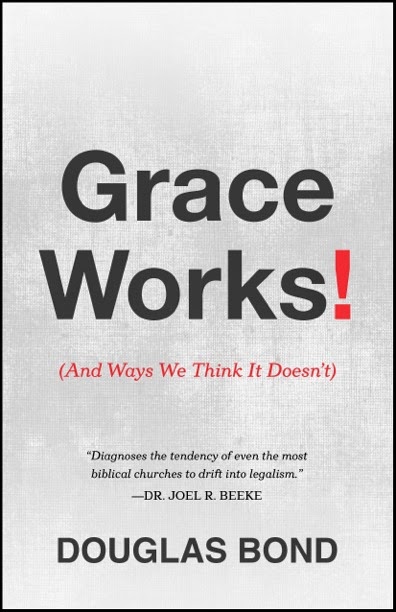I will never forget my first encounter
with Jerrell—it was 35 years ago this month. Rather, I will never forget my
first encounter with his hands, in that first handshake. As his massive,
work-hardened hand closed around mine, I thought, “This man could crush every
bone in my hand, if he had a mind to.” Glancing nervously up from our clasped
hands, I looked into his blue-gray eyes, sparkling with life and good humor,
the dimple crater in his cheek as he smiled at me—and I felt somewhat more
hopeful about the bones in my hand.
I thought I had callouses on my
hand, some callouses, sometimes—they weren’t entirely soft. But Jerrell’s hands
had a ready-to-grab-and-work look and feel, as if they had been formed and
shaped by hefting bars of iron—which, of course, they had been. Sure, my hands
had some degree of harder skin, in places, that might pass for callouses. But
Jerrell’s hands were callouses,
living, flexing monuments to a man who had made work into something akin to a
sacrament, a useful, joyful, holy activity that had shaped not only massive
steel buildings, and young apprentices, but had shaped his entire life.
How did those hands get to be
that way?
Jerrell was a man of tools and
work, a man of steel, a block of iron ore with arms and legs—and hands, hands
with callouses. Jerrell was certified to weld every ore on the planet, a man of
cultural dominion who took raw materials and shaped them into useful forms, a
man who tamed steel, made it do what he needed it to do to get the problem at
hand solved, to get the job accomplished.
And he did all this with a
full-bodied grin on his face (most of the time). Jerrell had fun doing it; and
it was contagious, even if you were the butt of the practical joke (ask Paul K
for the details; there are many details).
Jerrell could multi-task. He
could be about to flip down his welding hood, but just before striking an arc, pause
to tell a story. Nobody could tell a story like Jerrell. And he had stories to
tell. Hear the stories of his youth, and the wonder is that Jerrell lived long
enough to get Alzheimer’s. Stories of
his childhood on the ranch, in the mountains near Northbend, hunting,
shooting, blowing things up (including the outhouse—while his brother Garry was
using the outhouse), stories about pranks with wildcats, thugs, carburetors, gunpowder
and cannons, boating adventures. Jerrell was an endless source of entertainment
for his grandkids. When he wasn’t around, my kids would try to retell Grandpa
stories, but they never quite worked unless Jerrell was telling them. He
“remembered with advantages the feats he did that day.”
But being an ironworker was
dangerous, had its hazards. I’ll never forget receiving the phone call some
years ago, that Jerrell was being rushed from the job site to the hospital; a
1,500# steel I-beam had fallen on him. Fearful of the worst, when Cheryl and I
arrived, there was Jerrell sitting up in the ER gurney, as I recall it, telling
a story to the ER nurse, animated, full-bodied grin, big calloused hands
gesturing as he spun the yarn, dimple in all its splendor. For a moment, I felt
sorry for the steel I-beam. My guess is it had a permanent Jerrell-shaped crook
in it and was good for nothing but the scrap heap after attempting to crush
Jerrell Wayne Lewellen.
Though his hands were hardened
with callouses from work, it would be an enormous mistake to think of him as
calloused, in the sense of hard, detached, unfeeling. This block of iron ore,
was a man of tender feeling, a lover of his wife, his children, his
grandchildren—and he was a lover of books, and reading; a lover of Shakespeare,
but especially a lover of reading the Bible.
Though his hands were hard,
there was nothing hard and unfeeling about the man. With those same hands,
Jerrell milked a succession of cows—by hand, no machine needed or wanted—the
last cow named Lucy. It was yet another way he could provide for his family,
and, as he grew older, milking a cow by hand, twice a day, served as therapy,
not only to ease the arthritic pain in his hands, but as a spiritual activity,
a time of calm, of prayer, of quiet and tender reflection on the God who
provided so abundantly for Jerrell and his family, on the God he loved and
served with those hands, and that big, big heart.
Jerrell was a complex
individual. Hammer-and-tongs ironworker that he was, picture with me the man
holding court at lunch hour on the job site, young apprentices, who just that
morning had learned yet another trick of the trade, a better way to do it
right, now gathered around to hear Jerrell recite from his beloved Shakespeare.
The man who had decided that formal schooling was overrated a few weeks before
he would have graduated from high school, had later in his life discovered
Shakespeare, one of the early bonding moments for Jerrell and this son-in-law.
Listen in as Jerrell held court with those tough men, this passage one of his oft-recited
favorites:
The quality
of mercy is not strained;
It droppeth as the gentle rain from heaven
Upon the place beneath. It is twice blest;
It blesseth him that gives and him that takes:
‘T is mightiest in the mightiest; it becomes
The throned monarch better than his crown…
…mercy is above this sceptred sway;
It is enthronèd in the hearts of kings,
It is an attribute to God himself;
And earthly power doth then show likest God’s
When mercy seasons justice.
Therefore…
Though justice be thy plea, consider this,
That, in the course of justice, none of us
Should see salvation: we do pray for mercy;
And that same prayer doth teach us all to render
The deeds of mercy.
From this man, these ironworkers
heard some of the most profound and ultimate truths expressed in the most beautiful
words, words rendered with such gusto and feeling by Jerrell. During these Shakespeare
tutorials delivered to those, no doubt, bewildered ironworkers, he would pause
to savor another bite of his beloved Pat’s incomparable apple pie. Jerrell and
Pat had a mutual understanding. She would make all the pies Jerrell could eat,
so long as he picked and peeled the apples. Though Jerrell had selective
hearing loss, he heard and heeded this message. Nobody peeled apples like
Jerrell. It droppeth as the gentle rain from heaven
Upon the place beneath. It is twice blest;
It blesseth him that gives and him that takes:
‘T is mightiest in the mightiest; it becomes
The throned monarch better than his crown…
…mercy is above this sceptred sway;
It is enthronèd in the hearts of kings,
It is an attribute to God himself;
And earthly power doth then show likest God’s
When mercy seasons justice.
Therefore…
Though justice be thy plea, consider this,
That, in the course of justice, none of us
Should see salvation: we do pray for mercy;
And that same prayer doth teach us all to render
The deeds of mercy.
Picture the man, hunched over
the bucket, those hands again, hands deftly wielding one of his many razor-sharp
pocket knives, methodically peeling another Granny Smith, green curly-cue peel
trailing from his knife like a lacy work of art. I think of Jerrell peeling
those apples—and Pat baking them with such loving skill—as something of a
metaphor of their life together, of Jerrell’s life. It wasn’t finally about
just getting the job done, accomplishing another task. Peeling apples slowed
the pace, became another opportunity to pause and reflect, to take captive
every thought, every activity to the obedience of Jesus Christ. Life was
imminently important to Jerrell, but not just the big parts, planting the flag
on the newly completed skyscraper. Every cut, every weld was important. Peeling
the apples was important and to be done with artistry, and care, and love.
Peeling the apples was to be enjoyed as much as sinking his gold-filled teeth
into another scrumptious piece of Pat’s apple pie.
Building a house by his own
unique design, every brick laid with those same hands, or building a steel fishing
boat, a shop, the King Dome—building his family, whatever Jerrell was building,
whatever problem he was solving, he did it with gusto, with laughter, with
enjoyment. Jerrell lived out “Man’s chief end… to glorify God and to enjoy God
forever.” By the grace and mercy of Christ, this was Jerrell’s life—and now his
forevermore life.
A final word from Jerrell’s
beloved Shakespeare, lines he would sometimes recite as he watched the tide in
Dutcher’s Cove, his cove:
There
is a tide in the affairs of men Which, taken at the flood, leads on to fortune;
Omitted, all the voyage of their life
Is bound in shallows and in miseries.
On such a full sea are we now afloat,
And we must take the current when it serves,
Or lose our ventures.
By the grace of Christ, Jerrell
did not omit this all-important tide in the affairs of men. For him that tide
was the Water of Life, the only Savior of we broken and lost sinners, Jesus
Christ. Jerrell would not want the voyage of one of your lives to be bound in
shallows and in misery; he would not want one of you to lose your ventures. There
is only one way to die well, as Jerrell did. Take Jesus at the flood. It is a
full sea. The current now serves. Today—Jerrell’s memorial day—is the day of
salvation. Jerrell Wayne Lewellen, knowing and experiencing firsthand what heaven
is, I know Jerrell would want you to lay hold of Jesus Christ—today.








